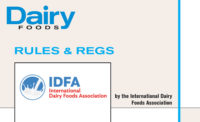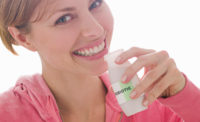Everything to know before exporting to China
This includes multiple steps, including adhering to recently announced new decrees.

Credit:narvikk/iStock / Getty Images Plus

In 2022, China was ranked No. 1 in U.S. exports of agricultural products. The total export value has increased significantly every year since 2018, rising 14% most recently from 2021 to 2022.
Exporting dairy to China is a process that includes multiple steps. New decrees came into effect January 1, 2022: Decree 248 and Decree 249. They are outlined as follows:
Decree 248 — Administrative Provision on Registration of Overseas Manufacturers of Imported Food requires all exporters to register with the General Administration of Customs of China (GACC). GACC now has an online platform for registration. Once completed, the China Import Food Enterprises platform will assign a registration number which must be included on the inner and outer packaging of all exported products.
Decree 249 — Administrative Measures on Import and Export Food Safety requires that all manufacturers ensure that product exported to China is safe for human consumption. GACC will complete assessments of the country of origin food safety regulations and history of control of hazards prior to allowing export from the country. All foods being imported to China must be meet Chinese regulatory standards. Manufacturers exporting to China must have a functioning food safety system in place to prevent hazards and ensure traceability for all exported products.
The newest decrees, 248 and 249, are in addition to the requirements already in place in order for dairy processors to export to China. All products sold in China must have the registration number, product name, production batch number, and date of production on the packaging. If product requires cooking or specific handling instructions for consumers, these must be provided in Chinese on the labels. Bulk products must be traceable back to the supplier.
Registration of dairy facilities for export must be submitted to the U.S. Food and Drug Administration (FDA). Registration must include the specific products you plan to export. As part of this application, dairy processors may be required to submit information on their food safety plan, cold chain compliance (the assurance that products maintain appropriate temperature throughout shipment), procedures for testing to ensure that product meets Chinese regulatory standards, and additional certifications their product is claiming. Additional certifications include things like organic, halal, and kosher.
Additionally, all shipments of dairy product to China must include a sanitary compliance certificate from the USDA Agricultural Marking Service. These certificates can be applied for online via the USDA web portal. Without these certificates, product may be rejected by Chinese customs.
All dairy products shipped to China must meet Chinese regulatory requirements. China requires aflatoxin M1 testing for the majority of dairy products. The limit is 0.5μg /kg of product. Testing must also include protein, fat, acidity, total plate count, coliform, S. aureus, and Salmonella for pasteurized milk.
Each dairy product category has a standard that includes the testing requirements. For instance, pasteurized milk is covered by standard GB 19645-2010, while sterilized milk is covered by GB 25190-2010. Cheese is covered by GB 5420-2010; cream and butter by GB 19646-2010; and milk powder is covered by GB-19644-2010. Infant formula has additional requirements for nutritional testing that is dictated by GB 10765-2010 and GB 10767-2010. Attestations of compliance may be an option for some of the requirements. Direct testing and reporting is most likely to allow for export.
GACC can test incoming dairy products prior to allowing them into China. If testing fails to meet regulatory requirements, products will be held. Retain samples may be retested if they are available, unexpired, and applicable to the exported lot of dairy products.
Prior to export, it is a good idea to review the USDA and FDA websites to determine if there have been changes to requirements. If more help is needed, there are several companies that can provide additional support for exporting to China. They can assist with labeling, tariff calculation, and testing.
Merieux NutriSciences offers a comprehensive suite of testing that may assist dairy processors in getting their product through customs.
Looking for a reprint of this article?
From high-res PDFs to custom plaques, order your copy today!






